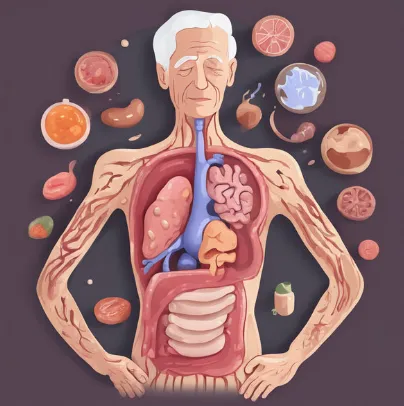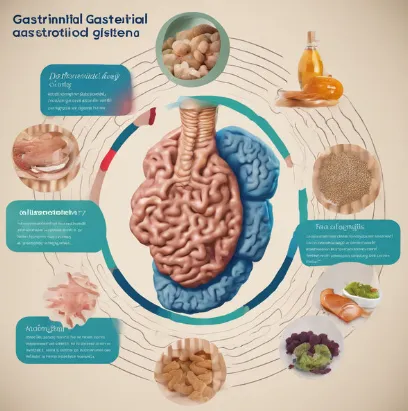The Gut-Brain Connection: Understanding Your Digestive Health

Our gut is often referred to as our “second brain”—and with good reason. The gut-brain axis, a direct link between our brain and our digestive system, has profound effects on digestion, mood, and overall well-being. This relationship is complex, and understanding it is crucial to nurturing gut health.
Why the Gut-Brain Axis Matters
The gut-brain axis connects our central nervous system (brain and spinal cord) with the enteric nervous system (gut nerves) through biochemical signaling. This means that the brain can influence gut function and vice versa. For example, stress can disrupt digestion, while poor digestive health can lead to mental and emotional challenges.
Neurotransmitters in the Gut
Interestingly, our gut produces about 95% of our body’s serotonin—a neurotransmitter that plays a major role in regulating mood. When digestion is poor, serotonin production can decrease, leading to feelings of anxiety or depression. Therefore, daily habits that support digestive health can improve mental clarity and emotional resilience.
Simple Tips to Support the the Gut-Brain Connection
Establish a Relaxation Routine: Practices like deep breathing, meditation, or even a short walk after meals can calm the nervous system, reducing digestive issues related to stress.
Avoid Multitasking During Meals: Give your mind a break and focus on your food to promote mindful eating and better digestion.
Include Omega-3 Fatty Acids: These healthy fats, found in fish, walnuts, and flaxseeds, help reduce inflammation and support brain function.
Fostering a healthier gut-brain connection can lead to smoother digestion, fewer GI issues, and a balanced mood. By understanding the role of the gut-brain axis, you’re one step closer to making daily habits for good digestion a reality.
Nourishing Your Core: The Power of Probiotics and Prebiotics
For a happy and efficient digestive system, gut-friendly bacteria (or probiotics) play an essential role. Along with probiotics, prebiotics (the food that nourishes these bacteria) are crucial in maintaining a balanced gut environment.
Probiotics: The Good Bacteria
Probiotics are beneficial bacteria that support digestion, immunity, and even mental health. Incorporating probiotics through food or supplements can help replenish gut bacteria, especially after illnesses or antibiotic treatments. Yogurt, kefir, sauerkraut, kimchi, and kombucha are excellent sources of probiotics.
Prebiotics: Fuel for Your Gut Flora
Prebiotics are non-digestible fibers found in foods like garlic, onions, bananas, and oats. These fibers serve as food for probiotics, helping them grow and thrive in your gut. Together, probiotics and prebiotics work to maintain a balanced gut microbiome, preventing harmful bacteria form taking over.
Building Probiotic and Prebiotic Habits
Incorporate Fermented Foods: Daily consumption of yogurt, kimchi, or kombucha can be a great source of probiotics. Try adding sauerkraut to your salads or kimchi as a side.
Opt for Fiber-Rich Foods: Whole grains, fruits, and vegetables are excellent sources of prebiotics.
Consider a Supplement: If dietary sources are insufficient, a probiotic supplement can help provide a consistent level of beneficial bacteria.
By focusing on these nutrient-rich additions, your daily habits for good digestion will naturally improve, supporting gut health and, in turn, overall wellness.
Hydrate Your Way to Health: The Importance of Water for Digestion
Water is often overlooked when it comes to digestive health, but staying hydrated is one of the simplest ways to improve digestion. Proper hydration supports the entire digestive process from beginning to end.
Why Hydration Matters for Digestion
Water aids in breaking down food, making it easier for the body to absorb nutrients. It also helps soften stool, preventing constipation. Dehydration can lead to slower digestion, resulting in bloating, gas, and discomfort.
Best Practices for Staying Hydrated
Drink Water Between Meals: Drinking water before and after meals, rather than during, can aid in digestion without diluting digestive enzymes.
Infuse Your Water: If plain water is unappealing, add a splash of lemon, cucumber, or mint for flavor and additional digestive benefits.
Consume Water-Rich Foods: Foods like cucumbers, watermelon, oranges, and tomatoes add to your daily hydration.
By ensuring adequate hydration, you support the natural digestive digestive processes and create daily habits for good digestion that are easy to maintain and beneficial long-term.
Mindful Eating for Optimal Digestion: Savor Every Bite
Eating mindfully is an easy yet powerful way to enhance digestion. When we slow down and pay attention to what we’re eating, we allow our body to digest food more effectively.
Benefits of Mindful Eating
Chewing Thoroughly: Properly chewing food breaks it down, making it easier to digest. It also signals your stomach to release the neccessary digestive enzymes.
Recognizing Fullness: Mindful eating helps you notice when youre full, preventing overeating—a common cause of digestive discomfort.
Reduced Stress Eating: By focusing on the present, mindful eating reduces the likelihood of emotional or stress-induced eating.
How to Practice Mindful Eating
Eliminate Distractions: Turn off the TV and put away your phone to fully engage with your meal.
Engage All Your Senses: Notice the colors, textures, and aromas of your food, savoring each bite.
Slow Down: Set your utensils down between bites to slow down your eating pace and improve digestion.
Mindful eating practices are simple daily habits for good digestion that can transform how you experience food and support a balanced digestive system.
Stress Less, Digest More: The Role of Stress Management in Gut Health
Stress affects every part of our body, and the digestive system is no exception. Chronic stress can disrupt the balance of bacteria in the gut and slow down the digestive process.
How Stress Impacts Digestion
Stress triggers the release of cortisol, which can reduce blood flow to the digestive tract and inhibit digestive enzymes. This results in issues like bloating, gas, and stomach cramps. Over time, unmanaged stress can lead to chronic conditions such as irritable bowel syndrome (IBS).
Practical Stress-Relief Habits for Gut Health
Practice Deep Breathing: Deep breathing exercises before or after meals activate the parasympathetic nervous system, promoting relaxation and optimal digestion.
Physical Activity: Regular exercise reduces stress and stimulates bowel movements.
Set Aside Time for Relaxation: Engaging in activities that calm you—whether it’s reading, taking a walk, or practicing yoga—can reduce cortisol levels and improve digestion.
By managing stress through daily habits, you can improve gut health, reduce digestive discomfort, and feel more in control of you’re overall wellness.

Good digestive health doesn’t require radical lifestyle changes. Simple, intentional daily habits like staying hydrated, eating mindfully, and managing stress can work wonders for digestion and overall well-being. By incorporating these practices into your routine, you’re building a foundation for a healthy gut and happier life. Remember, consistency is key. Stick wtih these habits and watch how your body—and even your mood—begins to transform. HEre’s to a healthier, happier gut and a revitalized you!



